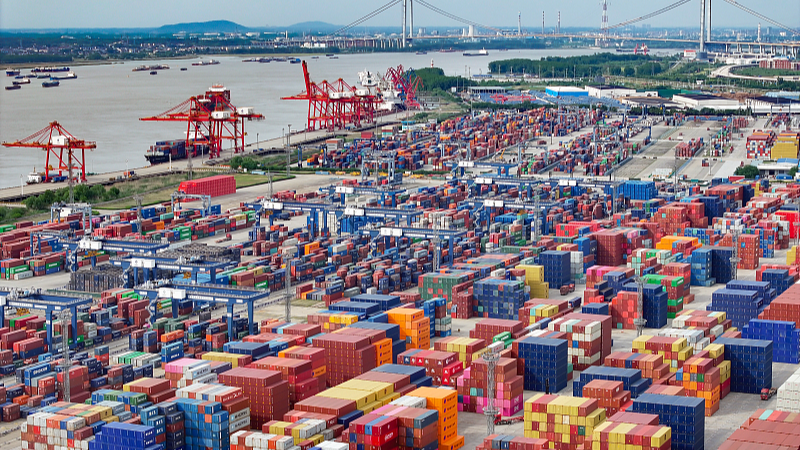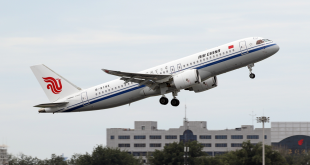Published: May 22,2024

The import and export container terminal of Longtan Port in Nanjing, China’s Jiangsu Province, May 9, 2024. /CFP
For the better part of 80 years, dating from the end of World War II, the United States was a steadfast advocate of free trade and globalization. Successive U.S. presidents insisted that trade involving all countries and to all parts of the world would enrich the lives of people across the globe. They also firmly believed that positive trade would lead to global peace.
Of course, because the U.S. was the conductor of globalization and the peace train, it dictated the rules. And with no other nation ready to challenge America’s hegemony, there was little reason for Washington to practice or preach protectionism. There also was no reason for it to listen to the needs or wants of disparate nations.
America’s message is different now. As China’s success with reform and opening-up has brought prosperity to it and many other lands, the U.S. is no longer the sole conductor of the train. That alone scares Washington’s political elite; and when those elites also recognize that China’s train operates differently (and perhaps more effectively), the anxiety increases. Consider one example of China’s philosophy, the Belt and Road Initiative, which has roughly 150 participating nations and in its first decade, with a focus on infrastructure, received investments of nearly $1 trillion.
In 2024, China will once again be the leader in driving global economic prosperity. Its government estimates that China will enjoy economic growth at almost 5 percent this year. The “Asia Economic Outlook and Integration Process Annual Report 2024” released during the annual Boao Forum for Asia earlier this year suggests that Asia will grow by roughly 4.5 percent in 2024. (By comparison, the U.S. is likely to see GDP growth at 2.6 percent, and Europe’s will be even lower, at an estimated 0.7 percent.) So 49 percent of the world’s purchasing power will come from the Asian continent.
Regional peace is one thing that cannot be overlooked during the examination of Asia’s economic expansion.
Chinese President Xi Jinping laid out his “New Asian Security Concept for New Progress in Security Cooperation” a decade ago. The principal goal is that all Asian nations share in a “common, comprehensive, cooperative and sustainable” security architecture. In his words, “Asia enjoys a rising status in the international strategic landscape and plays an increasingly important role in promoting a multipolar world and democracy in international relations. Such a sound situation in the region has not come easily and ought to be doubly cherished.”
Suffice it to say, it is not “cherished” in the U.S. and that has led Washington to engage in a sustained effort to undermine China’s growing partnerships and economic success. The almost Orwellian argument emanating from the U.S. is that China is doing bad by doing good, and that it is unwell despite being well. Washington’s argument includes encouraging people to accept that Beijing is engaging in a deliberate effort to threaten international security.
U.S. President Donald Trump speaks before signing Section 232 Proclamations on Steel and Aluminum Imports in the Oval Office of the White House in Washington, D.C., United States, March 8, 2018. /CFP
Rarely does a day go by when U.S. President Joe Biden or a member of his cabinet does not argue that China poses a national security threat; as a result, it is imperative that China be either denied sophisticated technological equipment that will further fuel its economic policies or that tariffs or outright bans must be implemented so that American (or European) consumers cannot have access to Chinese-manufactured products. Along the same lines, the U.S. regularly conducts naval exercises in the South China Sea, knowing that those activities, even though they take place in international waters, aggravate China.
Perhaps if U.S. officials look at their country’s history, they will recognize that the U.S. often bullied other nations to do what it wanted and dictated economic, political and humanitarian terms even if those ideologies had no history in the country where they were being force-fed. Perhaps they now fear that China will become the same kind of bully as it further establishes a multipolar world.
Holding such a belief means outright ignoring what President Xi has repeatedly said: Win-win cooperation means a compromise is found so that all sides come out of a deal victorious. It also means that China steadfastly refuses to tell its regional neighbors – or any other country for that matter – how they should conduct their domestic affairs.
It is worth remembering an old saying: The open hand is better than the closed fist.
Anthony Moretti, a special commentator for CGTN, is an associate professor at the Department of Communication and Organizational Leadership at Robert Morris University.
cgtn.com
 Africa -China Review Africa -China Cooperation and Transformation
Africa -China Review Africa -China Cooperation and Transformation
